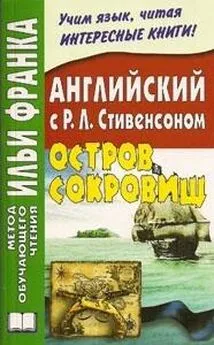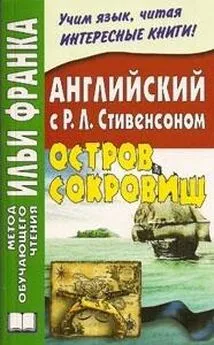Илья Франк - Английский язык с Р.Л. Стивенсоном. Остров сокровищ
- Название:Английский язык с Р.Л. Стивенсоном. Остров сокровищ
- Автор:
- Жанр:
- Издательство:неизвестно
- Год:неизвестен
- ISBN:нет данных
- Рейтинг:
- Избранное:Добавить в избранное
-
Отзывы:
-
Ваша оценка:
Илья Франк - Английский язык с Р.Л. Стивенсоном. Остров сокровищ краткое содержание
Английский язык с Р.Л. Стивенсоном. Остров сокровищ - читать онлайн бесплатно ознакомительный отрывок
Интервал:
Закладка:
yourself, seeing as I know what I owes you. But these men down there, they
couldn't keep their word — no, not supposing they wished to; and what's
more, they couldn't believe as you could.'
1. 'No,' said the doctor (сказал доктор). 'You're the man to keep your word, we
know that (/зато/ вы человек /чтобы держать/ слова, мы это знаем).'
2. Well, that was about the last news we had of the three pirates (это, пожалуй,
последние новости, которые мы имели о трех пиратах = больше мы ничего о
них не знаем). Only once we heard a gunshot a great way off (только однажды
мы услышали ружейный выстрел вдалеке), and supposed them to be hunting (и
решили, что они охотятся). A council was held, and it was decided that we must
desert them on the island (было проведено совещание, и было решено, что мы
должны оставить их на острове) — to the huge glee, I must say, of Ben Gunn
(должен сказать, к огромной радости Бена Ганна; glee — веселье, ликование ),
and with the strong approval of Gray (и с сильным одобрением Грея). We left a
good stock of powder and shot (мы оставили /им/ большой запас пороха и пуль;
stock — запасы, ассортимент, сырье ), the bulk of the salt goat, a few medicines
(груду соленой козлятины, немного лекарств; bulk — груда, масса, большое
количество ), and some other necessaries, tools, clothing, a spare sail (и
некоторые другие необходимые вещи, инструменты, одежду, запасной
Мультиязыковой проект Ильи Франка www.franklang.ru
751
парус), a fathom or two of rope, and, by the particular desire of the doctor, a
handsome present of tobacco (пару саженей веревки и, по особому желанию
доктора, значительную порцию табака; present — подарок ).
3. That was about our last doing on the island (это были, пожалуй, наши
последние действия на острове). Before that, we had got the treasure stowed
(перед этим мы погрузили сокровища), and had shipped enough water and the
remainder of the goat meat, in case of any distress (и погрузили достаточно воды
и остатков козлятины на всякий случай; to ship — грузить /на судно/,
перевозить; distress — нужда, горе, бедственное положение ); and at last, one
fine morning, we weighed anchor (наконец, в одно прекрасное утро, мы
подняли якорь), which was about all that we could manage (что было, пожалуй,
всем, что мы могли сделать; to manage — управлять, владеть; суметь,
справиться ), and stood out of North Inlet (и вышли из Северной бухты; to stand
out — удаляться от берега, отходить ), the same colours flying that the captain
had flown and fought under at the palisade (/над нами/ развевался тот же самый
флаг, под которым капитан /и все мы/ сражались /защищая/ крепость).
desert [`dezqt] huge [hjHG] approval [q`prHvl] particular [pq`tIkjulq] weighed
[weId]
1. 'No,' said the doctor. 'You're the man to keep your word, we know that.'
2. Well, that was about the last news we had of the three pirates. Only once we
heard a gunshot a great way off, and supposed them to be hunting. A council
was held, and it was decided that we must desert them on the island — to the
huge glee, I must say, of Ben Gunn, and with the strong approval of Gray. We
left a good stock of powder and shot, the bulk of the salt goat, a few medicines,
and some other necessaries, tools, clothing, a spare sail, a fathom or two of
Мультиязыковой проект Ильи Франка www.franklang.ru
752
rope, and, by the particular desire of the doctor, a handsome present of
tobacco.
3. That was about our last doing on the island. Before that, we had got the
treasure stowed, and had shipped enough water and the remainder of the goat
meat, in case of any distress; and at last, one fine morning, we weighed
anchor, which was about all that we could manage, and stood out of North
Inlet, the same colours flying that the captain had flown and fought under at
the palisade.
1. The three fellows must have been watching us closer than we thought for (трое
парней = разбойников, должно быть, следили за нами гораздо внимательнее,
чем мы думали), as we soon had proved (как мы вскоре убедились; to prove —
доказывать, удостоверять, подтверждать ). For, coming through the narrows,
we had to lie very near the southern point (потому что, проходя через узкий
пролив, нам пришлось держаться очень близко к южной оконечности
/острова/), and there we saw all three of them kneeling together on a spit of sand
(и там мы увидели всех троих, стоявших вместе на коленях на песчаной
косе), with their arms raised in supplication (с поднятыми в мольбе руками). It
went to all our hearts, I think, to leave them in that wretched state (всем нам было
тяжело: «это вошло в наши сердца», думаю, оставлять их в этом жалком
положении; wretched — несчастный, жалкий, обездоленный; state —
состояние, положение ); but we could not risk another mutiny (но мы не могли
рисковать /поднятием/ нового мятежа); and to take them home for the gibbet
would have been a cruel sort of kindness (и доставить их домой для виселицы
было бы жестоким видом доброты). The doctor hailed them and told them of the
stores we had left (доктор окликнул их и рассказал о припасах, которые мы
оставили), and where they were to find them (и где они могут их найти). But
they continued to call us by name (но они продолжали называть нас по
именам), and appeal to us, for God's sake, to be merciful (и взывали к нам,
Мультиязыковой проект Ильи Франка www.franklang.ru
753
/умоляли/ ради Бога, быть милосердными), and not leave them to die in such a
place (и не оставлять их умирать в таком месте).
2. At last, seeing the ship still bore on her course (наконец, видя, что корабль по-
прежнему идет своим курсом; to bear on — двигаться в заданном
направлении ), and was now swiftly drawing out of earshot (и теперь
стремительно уносится от них; to draw out — вытаскивать; уходить вперед
/от соперника/; earshot — предел слышимости, близкое расстояние ), one of
them — I know not which it was (один из них — не знаю, который) — leapt to
his feet with a hoarse cry (вскочил на ноги с хриплым криком), whipped his
musket to his shoulder (резко поднял к плечу мушкет; to whip — хлестать,
действовать быстро ), and sent a shot whistling over Silver's head and through
the mainsail (и выпустил пулю, просвистевшую над головой Сильвера и
/пролетевшую/ через = продырявившую грот).
supplication [sAplI`keISn] wretched [`retSId] gibbet [`GIbIt] earshot [`IqSOt]
1. The three fellows must have been watching us closer than we thought for, as
we soon had proved. For, coming through the narrows, we had to lie very
near the southern point, and there we saw all three of them kneeling together
on a spit of sand, with their arms raised in supplication. It went to all our
hearts, I think, to leave them in that wretched state; but we could not risk
another mutiny; and to take them home for the gibbet would have been a
cruel sort of kindness. The doctor hailed them and told them of the stores we
had left, and where they were to find them. But they continued to call us by
name, and appeal to us, for God's sake, to be merciful, and not leave them to
die in such a place.
Мультиязыковой проект Ильи Франка www.franklang.ru
754
2. At last, seeing the ship still bore on her course, and was now swiftly
drawing out of earshot, one of them — I know not which it was — leapt to his
feet with a hoarse cry, whipped his musket to his shoulder, and sent a shot
whistling over Silver's head and through the mainsail.
1. After that, we kept under cover of the bulwarks (после этого мы спрятались за
фальшбортом), and when next I looked out they had disappeared from the spit (и
когда я потом выглянул, они исчезли с косы), and the spit itself had almost
melted out of sight in the growing distance (и сама коса почти исчезла из поля
зрения на возрастающем расстоянии; to melt — таять, плавиться; исчезать ).
That was, at least, the end of that (это было, наконец, концом /всего/ этого); and
before noon, to my inexpressible joy (а до полудня, к моей невыразимой
радости; to express — выражать ), the highest rock of Treasure Island had sunk
Читать дальшеИнтервал:
Закладка:


